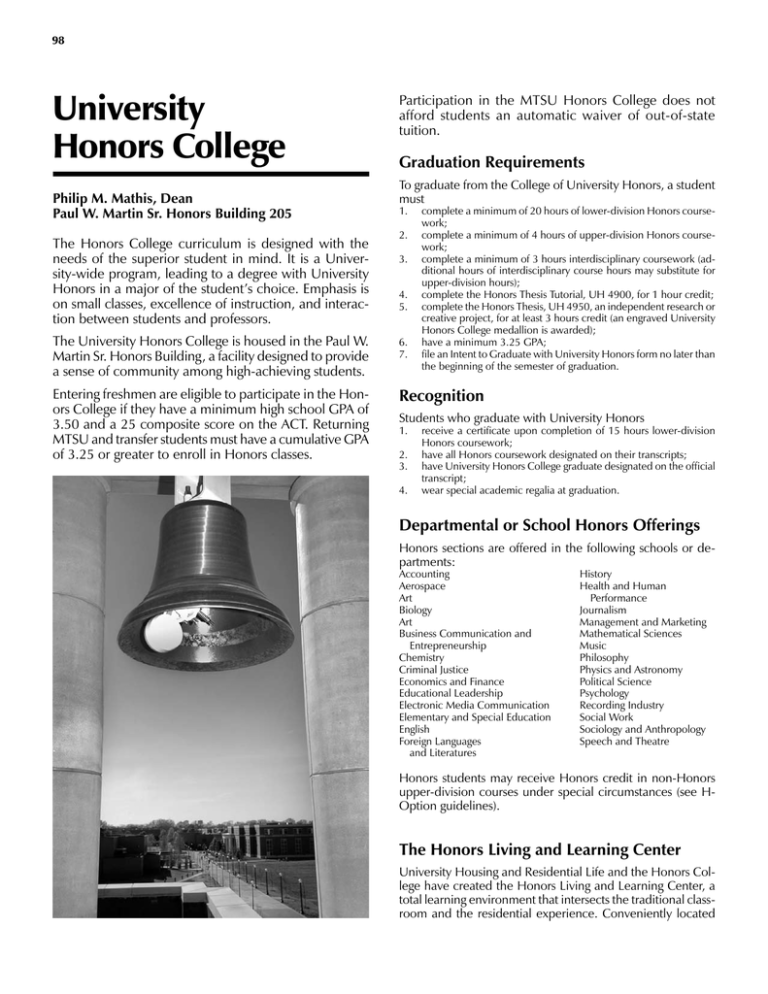University
advertisement

98 University Honors College University Honors College Philip M. Mathis, Dean Paul W. Martin Sr. Honors Building 205 The Honors College curriculum is designed with the needs of the superior student in mind. It is a University-wide program, leading to a degree with University Honors in a major of the student’s choice. Emphasis is on small classes, excellence of instruction, and interac­ tion between students and professors. Participation in the MTSU Honors College does not afford students an automatic waiver of out-of-state tuition. Graduation Requirements To graduate from the College of University Honors, a student must 1. 2. 3. 4. 5. complete a minimum of 20 hours of lower-division Honors coursework; complete a minimum of 4 hours of upper-division Honors coursework; complete a minimum of 3 hours interdisciplinary coursework (additional hours of interdisciplinary course hours may substitute for upper-division hours); complete the Honors Thesis Tutorial, UH 4900, for 1 hour credit; complete the Honors Thesis, UH 4950, an independent research or creative project, for at least 3 hours credit (an engraved University Honors College medallion is awarded); have a minimum 3.25 GPA; file an Intent to Graduate with University Honors form no later than the beginning of the semester of graduation. The University Honors College is housed in the Paul W. Martin Sr. Honors Building, a facility designed to provide a sense of community among high-achieving students. 6. 7. Entering freshmen are eligible to participate in the Honors College if they have a minimum high school GPA of 3.50 and a 25 composite score on the ACT. Returning MTSU and transfer students must have a cumulative GPA of 3.25 or greater to enroll in Honors classes. Recognition Students who graduate with University Honors 1. 2. 3. 4. receive a certificate upon completion of 15 hours lower-division Honors coursework; have all Honors coursework designated on their transcripts; have University Honors College graduate designated on the official transcript; wear special academic regalia at graduation. Departmental or School Honors Offerings Honors sections are offered in the following schools or departments: Accounting History Aerospace Health and Human Art Performance Biology Journalism Art Management and Marketing Business Communication and Mathematical Sciences Entrepreneurship Music Chemistry Philosophy Criminal Justice Physics and Astronomy Economics and Finance Political Science Educational Leadership Psychology Electronic Media Communication Recording Industry Elementary and Special Education Social Work English Sociology and Anthropology Foreign Languages Speech and Theatre and Literatures Honors students may receive Honors credit in non-Honors upper-division courses under special circumstances (see HOption guidelines). The Honors Living and Learning Center University Housing and Residential Life and the Honors College have created the Honors Living and Learning Center, a total learning environment that intersects the traditional classroom and the residential experience. Conveniently located next to Walker Library, Wood and Felder halls are connected by a spacious lobby, study room, Honors classroom, and computer lab. Honors students who enroll in at least one three-hour Honors course per semester qualify for residency with no additional cost. Courses in University Honors [UH] 3000 University Honors Lecture Series. One credit. A series of weekly one-hour lectures designed to stimulate thought and broaden the student’s knowledge in a variety of fields. May be repeated for up to 3 hours credit. Pass/Fail. 3001 Honors Service Learning Practicum. One to three credits. Prerequisite: Permission of instructor. Opportunity to take part in service learning projects with community or on-campus partners. Pass/Fail. (May be repeated once for a total of three credits.) 3200 Visiting Artist’s Seminar. One credit. Prerequisites: Sophomore standing and maintenance of a 3.25 GPA. An intensive workshop/ seminar in one artistic form. The instructor will be a visiting artist whose course topic will depend on his or her field of experience. 3500 Junior Interdisciplinary Seminar. Three credits. (May be taken more than one time as topics change.) Introduces students to the political, social, economic, scientific, artistic, and/or humanistic aspects of culture, using an interdisciplinary approach. See class schedule for current semester’s topic. 4010 MTSU Institute of Leadership Excellence. Three credits. Prerequisites: Permission of instructor; 3.0 cumulative GPA; must have completed 60 credit hours by start of course. An intensive learning experience in leadership excellence. Involves significantly more clock hours than the typical three-credit-hour course but offers a remarkably unique experience. The institute has three primary objectives: academic study of leadership theory and practice, with an emphasis on application; extensive exposure to accomplished leaders; and completion of a substantial student project, a part of which will be a personal action plan for leadership growth. Participants must be prepared to attend morning, afternoon, and evening sessions for three weeks during Summer Session I in May. 4600 Senior Interdisciplinary Seminar. Three credits. (May be taken more than once as topics change.) Examines humanistic ideas. Reading materials drawn from literature, history, philosophy, science, art, and/or any other areas relevant to the semester topic. See class schedule for current semester’s topic. 4850 Study Abroad Tutorial. One credit. Prerequisite: Permission of dean, Honors College. Guided tutorial with faculty assigned from the student’s discipline; intended to enrich the study experience abroad and enable students to apply coursework completed abroad as upper-division Honors credit toward the requirements for graduation with University Honors. May be repeated for a maximum of three credits. Pass/Fail. May be repeated on subsequent trips for a maximum of three credits. 4900 Honors Thesis Tutorial. One credit. Designed to guide students and their advisors in the completion of an Honors thesis. Specific objectives include choosing and narrowing an appropriate topic, collecting a working bibliography, preliminary reading, and writing a thesis proposal. Pass/Fail. 4950 Honors Independent Research. Three to nine credits. (Only 3 credit hours may be counted toward the 31-hour requirement.) Interdisciplinary research for the advanced Honors student. Research proposals must be approved by the Honors Council the semester prior to the study. University Honors College 99



